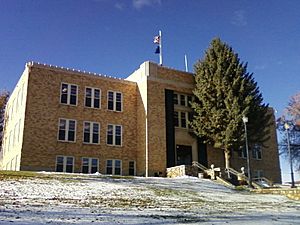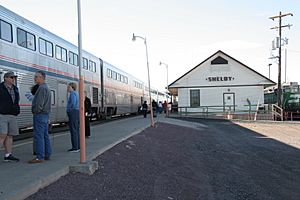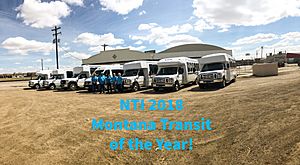Shelby, Montana facts for kids
Quick facts for kids
Shelby, Montana
|
|
|---|---|
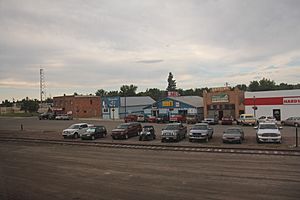
Downtown Shelby
|
|
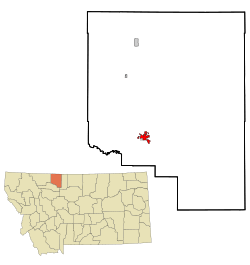
Location of Shelby, Montana
|
|
| Country | United States |
| State | Montana |
| County | Toole |
| Area | |
| • Total | 5.96 sq mi (15.43 km2) |
| • Land | 5.78 sq mi (14.97 km2) |
| • Water | 0.17 sq mi (0.45 km2) |
| Elevation | 3,297 ft (1,005 m) |
| Population
(2020)
|
|
| • Total | 3,169 |
| • Density | 548.08/sq mi (211.63/km2) |
| Time zone | UTC-7 (Mountain (MST)) |
| • Summer (DST) | UTC-6 (MDT) |
| ZIP code |
59474
|
| Area code(s) | 406 |
| FIPS code | 30-67450 |
| GNIS feature ID | 0776465 |
Shelby is a city in Montana, United States. It is the main town, or county seat, of Toole County. In 2020, about 3,169 people lived there.
Contents
Shelby's Story: A Look Back in Time
Shelby got its name from Peter O. Shelby. He was a general manager for the Montana Central Railway. A train station was built here around 1892. It was where two big railways, the Great Northern and the Great Falls & Canada, met.
On July 4, 1923, Shelby hosted a huge event. It was a heavyweight boxing match between Jack Dempsey and Tommy Gibbons. This fight was for the world championship title. The event was so big it almost caused the town to run out of money!
In the early 2000s, Shelby was home to a special dog camp. It was called Camp Collie and helped dogs that had been treated badly. This camp even made national news.
Near Shelby, you'll find Welker Farms. This is a large farm known for its popular videos online.
In 2020, the Well Done Foundation opened a visitor center in Shelby. This group works to plug old, unused oil wells.
Where is Shelby?
Shelby is located close to the Marias River and also Aloe Lake.
The city covers about 6.18 square miles (16.01 km2) of land and water. Most of this area, about 6.03 square miles (15.62 km2), is land. The rest, about 0.15 square miles (0.39 km2), is water.
Shelby's Weather and Climate
Shelby has four clear seasons. It has a dry climate. Winters are long and cold. Spring weather can arrive anytime from March to May. Summers can be hot and dry. During summer, the area often gets lightning, hail, and strong thunderstorms.
Fall weather is hard to predict. Sometimes snow falls in October. Other years, warm temperatures last until late November. Because Shelby is near the Rocky Mountain Front, it is often windy.
We don't have a lot of old weather information for Shelby. But a weather station that started in the late 1990s shows that Shelby is a bit warmer than nearby towns like Cut Bank.
| Climate data for Shelby, Montana, 1991–2020 normals, extremes 1950–present | |||||||||||||
|---|---|---|---|---|---|---|---|---|---|---|---|---|---|
| Month | Jan | Feb | Mar | Apr | May | Jun | Jul | Aug | Sep | Oct | Nov | Dec | Year |
| Record high °F (°C) | 69 (21) |
69 (21) |
78 (26) |
86 (30) |
91 (33) |
97 (36) |
102 (39) |
103 (39) |
96 (36) |
89 (32) |
74 (23) |
65 (18) |
103 (39) |
| Mean maximum °F (°C) | 55.3 (12.9) |
55.9 (13.3) |
64.4 (18.0) |
74.3 (23.5) |
83.8 (28.8) |
88.9 (31.6) |
96.2 (35.7) |
95.7 (35.4) |
89.9 (32.2) |
78.2 (25.7) |
64.6 (18.1) |
54.1 (12.3) |
96.4 (35.8) |
| Mean daily maximum °F (°C) | 31.4 (−0.3) |
35.5 (1.9) |
43.9 (6.6) |
54.2 (12.3) |
64.4 (18.0) |
72.6 (22.6) |
82.2 (27.9) |
82.2 (27.9) |
70.9 (21.6) |
56.2 (13.4) |
42.0 (5.6) |
33.1 (0.6) |
55.7 (13.2) |
| Daily mean °F (°C) | 18.8 (−7.3) |
22.6 (−5.2) |
31.2 (−0.4) |
41.3 (5.2) |
51.2 (10.7) |
59.3 (15.2) |
66.8 (19.3) |
65.8 (18.8) |
55.7 (13.2) |
42.6 (5.9) |
29.8 (−1.2) |
21.1 (−6.1) |
42.2 (5.7) |
| Mean daily minimum °F (°C) | 6.1 (−14.4) |
9.9 (−12.3) |
18.4 (−7.6) |
28.4 (−2.0) |
38.0 (3.3) |
46.0 (7.8) |
51.5 (10.8) |
49.3 (9.6) |
40.5 (4.7) |
29.0 (−1.7) |
17.6 (−8.0) |
9.1 (−12.7) |
28.7 (−1.9) |
| Mean minimum °F (°C) | −21.6 (−29.8) |
−13.8 (−25.4) |
−5.7 (−20.9) |
13.0 (−10.6) |
23.4 (−4.8) |
35.1 (1.7) |
42.0 (5.6) |
38.5 (3.6) |
26.9 (−2.8) |
10.0 (−12.2) |
−5.7 (−20.9) |
−16.8 (−27.1) |
−28.4 (−33.6) |
| Record low °F (°C) | −44 (−42) |
−37 (−38) |
−37 (−38) |
−9 (−23) |
12 (−11) |
30 (−1) |
36 (2) |
30 (−1) |
16 (−9) |
−12 (−24) |
−31 (−35) |
−36 (−38) |
−44 (−42) |
| Average precipitation inches (mm) | 0.46 (12) |
0.36 (9.1) |
0.63 (16) |
1.34 (34) |
1.77 (45) |
2.85 (72) |
1.14 (29) |
0.85 (22) |
1.01 (26) |
0.74 (19) |
0.52 (13) |
0.46 (12) |
12.13 (309.1) |
| Average snowfall inches (cm) | 7.3 (19) |
5.8 (15) |
6.9 (18) |
4.1 (10) |
1.9 (4.8) |
0.0 (0.0) |
0.0 (0.0) |
0.0 (0.0) |
0.5 (1.3) |
1.4 (3.6) |
5.5 (14) |
5.5 (14) |
38.9 (99.7) |
| Average precipitation days (≥ 0.01 in) | 5.1 | 5.4 | 6.0 | 7.3 | 9.3 | 11.1 | 5.8 | 5.7 | 6.1 | 5.4 | 4.6 | 5.2 | 77.0 |
| Average snowy days (≥ 0.1 in) | 4.2 | 4.1 | 3.1 | 1.8 | 0.5 | 0.0 | 0.0 | 0.0 | 0.1 | 0.7 | 2.6 | 3.7 | 20.8 |
| Source 1: NOAA | |||||||||||||
| Source 2: National Weather Service | |||||||||||||
Who Lives in Shelby?
| Historical population | |||
|---|---|---|---|
| Census | Pop. | %± | |
| 1920 | 537 | — | |
| 1930 | 2,004 | 273.2% | |
| 1940 | 2,538 | 26.6% | |
| 1950 | 3,058 | 20.5% | |
| 1960 | 4,017 | 31.4% | |
| 1970 | 3,111 | −22.6% | |
| 1980 | 3,142 | 1.0% | |
| 1990 | 2,763 | −12.1% | |
| 2000 | 3,216 | 16.4% | |
| 2010 | 3,376 | 5.0% | |
| 2020 | 3,169 | −6.1% | |
| U.S. Decennial Census | |||
In 2010, there were 3,376 people living in Shelby. They lived in 1,245 homes. About 717 of these were families.
Most people in Shelby were White (89.5%). There were also Native American (6.5%), African American (0.8%), and Asian (0.5%) residents. Some people were from other backgrounds or more than one race. About 3% of the people were Hispanic or Latino.
In the homes, 28.3% had children under 18. About 43.8% were married couples. The average home had 2.17 people. The average family had 2.84 people.
The average age of people in Shelby was 40.3 years old. About 18.9% of residents were under 18. And 13.6% were 65 or older. More males lived in Shelby (58.3%) than females (41.7%).
Learning in Shelby
Shelby Public Schools teach students from kindergarten all the way through 12th grade. In the 2021-2022 school year, Shelby High School had 112 students. Their sports teams are called the Coyotes.
The Toole County Library is a public library in Shelby. It's a great place to find books and learn new things.
News and Radio in Shelby
The local newspaper for Shelby is called the Shelby Promoter. It comes out every week. You can also read it online.
Shelby has two radio stations. They are KSEN AM 1150 and KZIN-FM 96.7. Both stations are owned by a company called Townsquare Media.
Getting Around Shelby
Shelby has an Amtrak train station. Amtrak is the national passenger train system. Trains stop daily in Shelby. The Empire Builder train travels from Chicago to Seattle and Portland, Oregon. The area where freight trains are sorted is called the Port of Northern Montana.
Shelby is also located where two major roads meet: Interstate 15 and U.S. Route 2.
Northern Transit Interlocal is a local bus system. It provides rides to nearby cities like Great Falls and Kalispell.
The Shelby Airport is owned by the county. It's about two miles north of town. If you need to fly on a commercial airline, the closest big airport is Great Falls International Airport. It's about 86 miles (138 km) south of Shelby.
Famous People from Shelby
- James Grady is an author who was born and grew up in Shelby.
- Leroy Hood, a scientist known for his work on the Human Genome Project, grew up here.
- Jack Horner, a paleontologist (someone who studies dinosaurs and ancient life), was born in Shelby.
- Larry Krystkowiak was a professional basketball player in the NBA. He grew up in Shelby.
See also
 In Spanish: Shelby (Montana) para niños
In Spanish: Shelby (Montana) para niños


